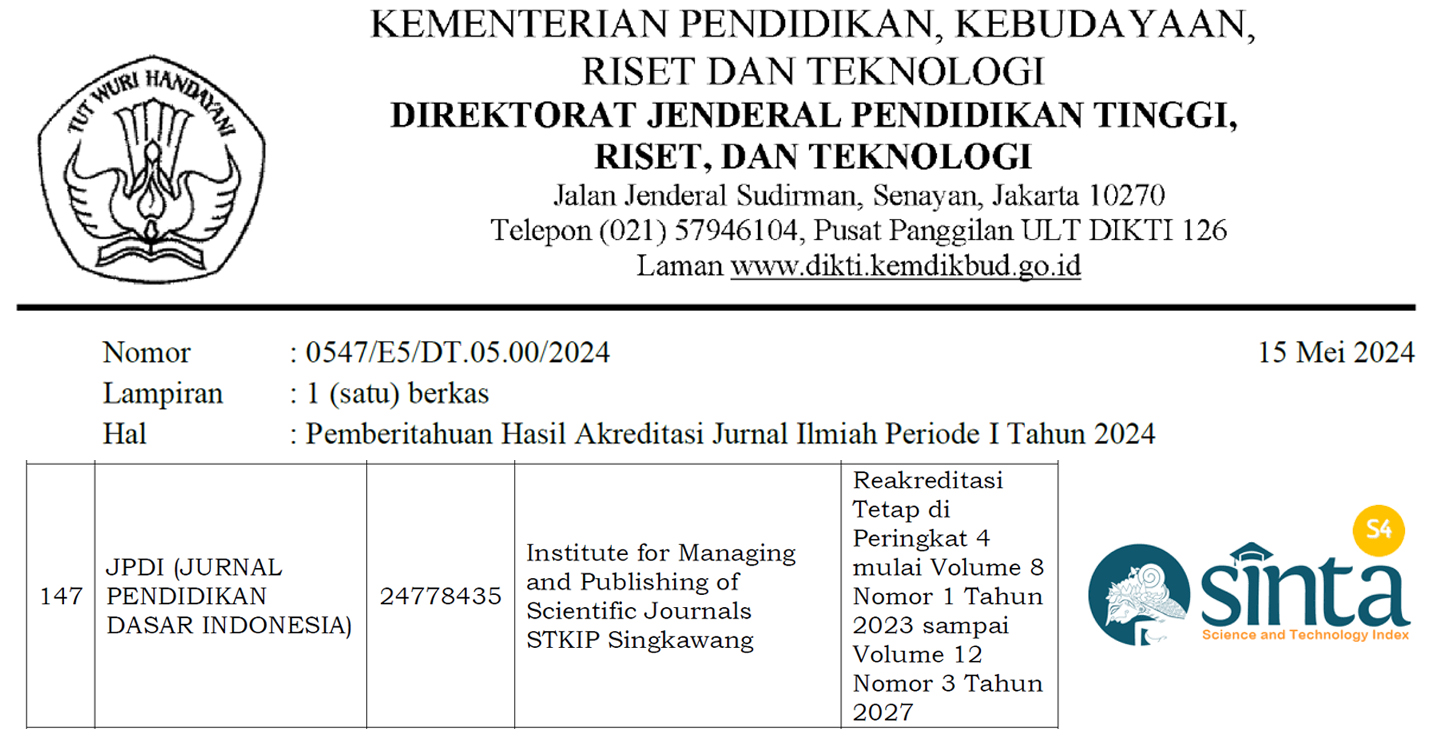DEVELOPING OF NUMBERS LEARNING MODULE FOR PRIMARY SCHOOL STUDENTS BYCONTEXTUAL TEACHING AND LEARNING APPROACH
Abstract
This study purposedto develop module of numbers learning by CTL approach. Through CTL strategies, students were expected to learn through 'experience', but not 'memorize'. This module included activities to create a meaningful relationship, presenting a problem in the form of open-ended, problem possing assembling, collaborating, presenting individually services through checking the understanding, and self-assessment. The development model used in this research were divided into three phases: (1) the initial investigation phase (2) the prototype phase, and (3) the assessment phase. The research instrument composed in this study consisted of; (1) questionnaire responses of experts and practitioners, (2) student questionnaire, (3) sheets and questionnaires observation, (4) the test sheet. This development product had fulfilled valid criteria by the achievement of the module validation was 3.31 (high criteria), Observation Students’Activities validation was 3.52 (high criteria), Students’ Questionnaire Response validation was 3.27 (high criteria), and Test Learning Result validation was 3.44 (high criteria). Based on the validation results, it could be concluded that the module and instrument which were developed was valid.
Keywords
Full Text:
PDFReferences
Akbar, Sa’dun. (2014). Penyegaran Pembelajaran Tematik Berbasis KKNI Kurikulum 2013: makalah kuliah umum. Malang: Universitas Kanjuruhan Malang.
Johnson, Elaine B. (2002). Contextual Teaching and Learning: what it is and why it’s here to stay. California: A Sage Publications Company
Johnson, Elaine B. (2002). Contextual Teaching and Learning: Menjadikan Kegiatan Belajar-Mengajar Mengasyikkan dan Bermakna. Terjemahan oleh Ibnu Setiawan. 2009. Bandung: MLC
Majid, Abdul. (2014). Pembelajaran Tematik Terpadu. Bandung: PT Remaja Rosdakarya
Nurhadi & Senduk, Agus G. (2009). Pembelajaran Kontekstual. Surabaya: PT JePe Press Media Utama
Plomp, T. (2007). Formative Evaluation in Educational Design Research. Dalam An Introduction to Educational Design Research. Proceedings of the seminar conducted at the East China Normal University, Shanghai (PR China), November 23 – 26, 2007.
Riadi, M. (2013). Pengertian-Kelebihan-Kelemahan-Modul-Pembelajaran.(online). http://www.kajianpustaka.com/2013/03/pengertian-kelebihan-kelemahan-modul-pembelajaran.html
Santrock, John W. (2009). Psikologi Pendidikan (Educational Psychology) (edisi 3). Jakarta: Salemba Humanika
Suaidin. (2010). Teknik Penyusunan Modul,(Online), http://suaidinmath.wordpress.com diakses tanggal 11 Juli 2012
DOI: http://dx.doi.org/10.26737/jpdi.v1i2.264
Refbacks
- There are currently no refbacks.

This work is licensed under a Creative Commons Attribution-NonCommercial 4.0 International License.
Published by:
Institute of Managing and Publishing of Scientific Journals, STKIP Singkawang
Address : STKIP Singkawang, Jalan STKIP - Kelurahan Naram Singkawang, Kalimantan Barat, INDONESIA, 79251
No. Telp. : +62562 420 0344
No. Fax. : +62562 420 0584
JPDI (Jurnal Pendidikan Dasar Indonesia)
e-ISSN : 2477-8435
p-ISSN : 2477-5940

Editor in Chief Contact: [email protected] / [email protected] / Wa: +6281345376986
Publisher Contact: [email protected] / [email protected] / Wa: +6282142072788
Management Tools
JPDI indexed by:
JPDI (Jurnal Pendidikan Dasar Indonesia) is licensed under a Creative Commons Attribution-NonCommercial 4.0 International License.









